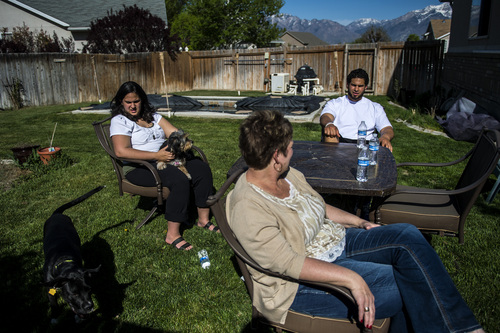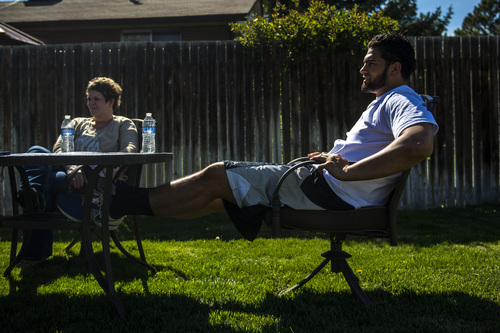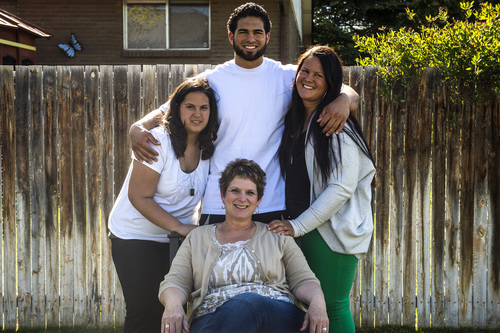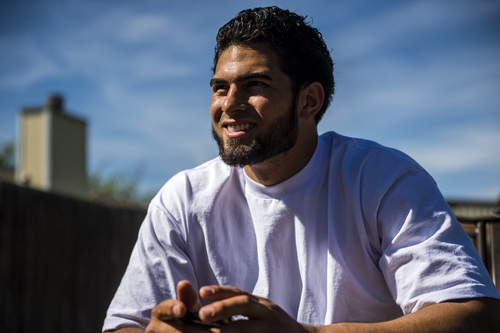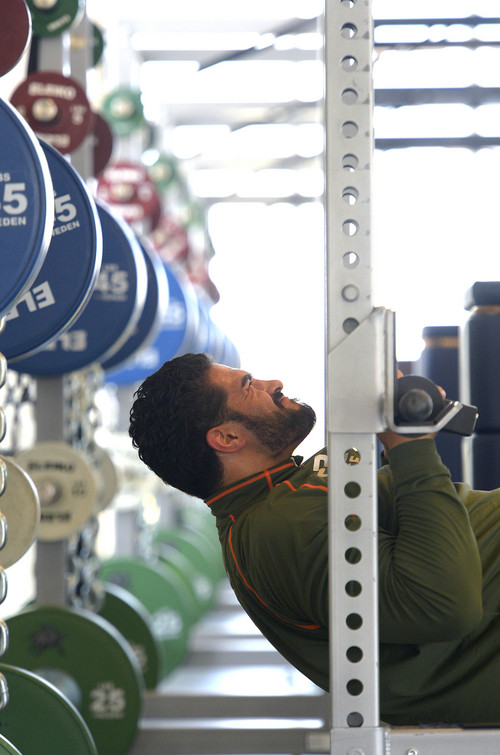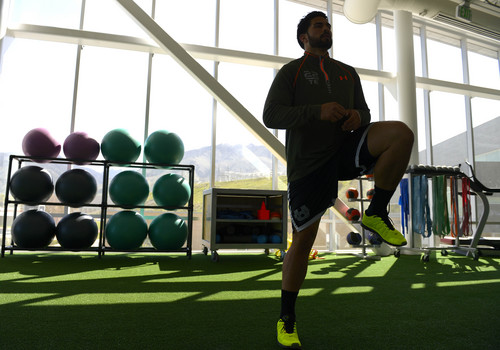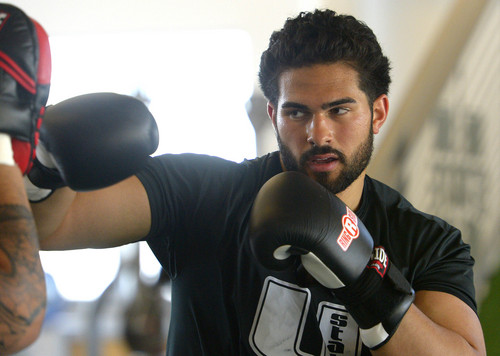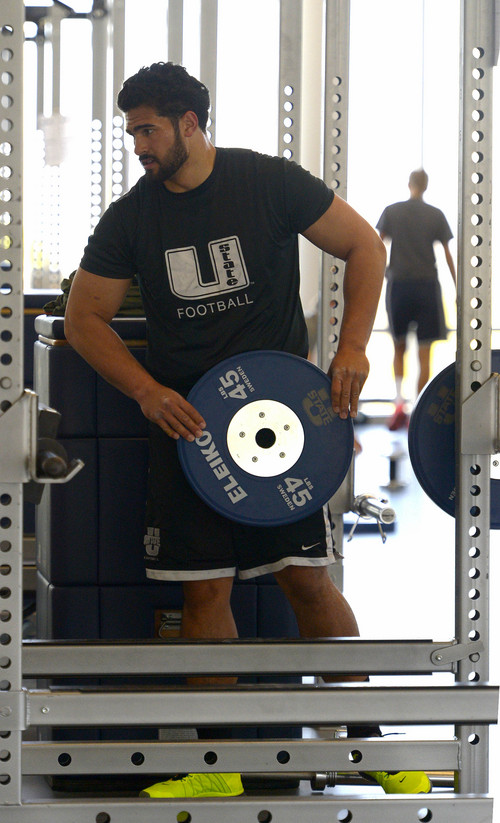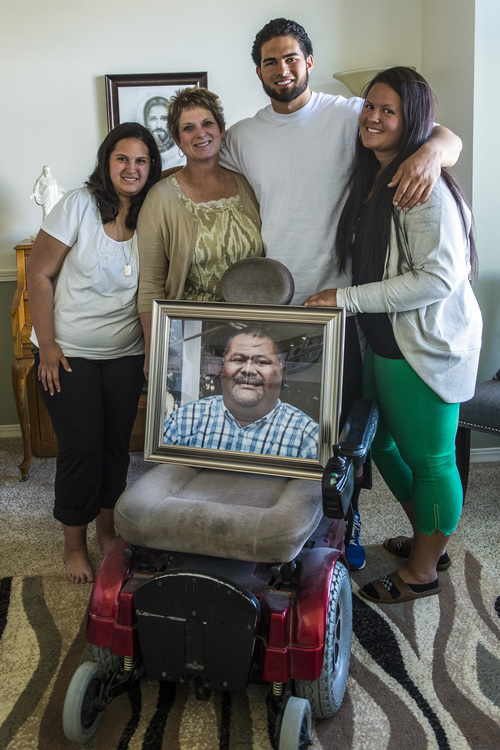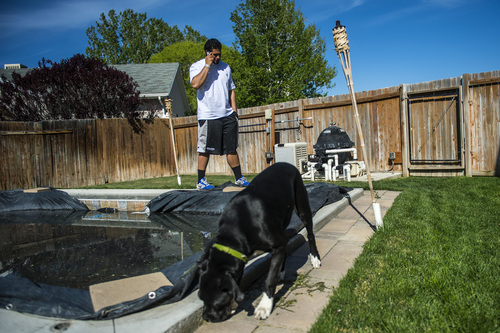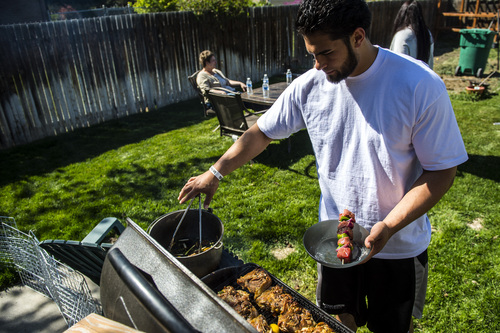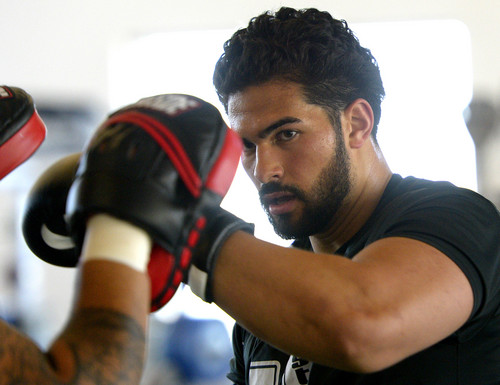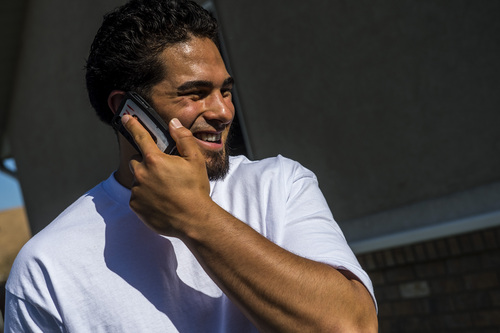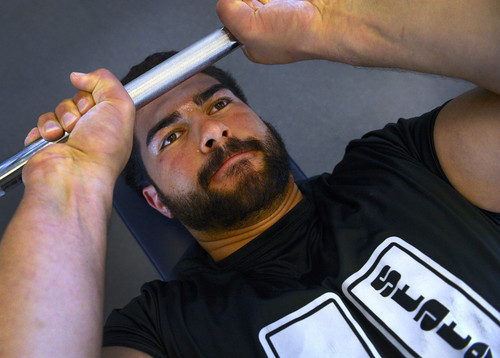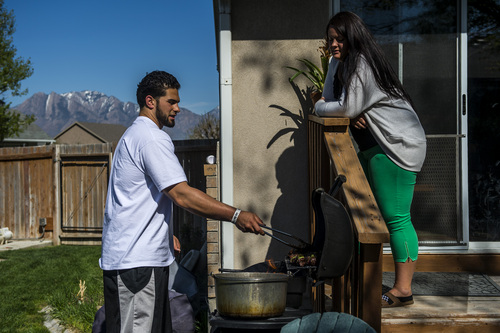This is an archived article that was published on sltrib.com in 2014, and information in the article may be outdated. It is provided only for personal research purposes and may not be reprinted.
West Jordan • Before the years stretched out his limbs, widened his shoulders and chest, and grew a dark beard around his strong jaw, D.J. Tialavea was a boy who sought something greater.
At West Jordan High School, on the redbrick wall of the football team's cramped weight room, hung a neatly folded white jersey in a glass frame. A monument to Travis Hall, the only West Jordan alumnus to play in the NFL, the jersey constantly caught D.J.'s eyes as he worked through pain and sweat.
D.J., 22, is a week away from realizing the vision of adding his own jersey to the wall.
The West Jordan native and former Utah State tight end is expected either to be selected in the late rounds of the NFL Draft or signed as a free agent. Although a foot fracture ended his senior season prematurely, he should figure into the pro ranks based on his blocking ability and his 6-foot-4, 260-pound stature.
On Saturday, D.J. expects his phone to ring with good news on the other end.
But it won't be the voice D.J. longs to hear.
His father, Don Tialavea, died in November. In the months since, the Tialaveas have moments when they hear Don's voice, echoing in their minds rather than down the corridors of their two-level West Jordan home. The bedroom where he lived out the painful last years of his life feels hollow, with a wide empty bed and his collage of photos — of his kids Julianne, D.J. and Abigail — in boxes. Rows of naked nails protrude from the walls. No one has moved his wheelchair, which sits folded in the hallway.
In life, Don believed a man's wealth could be measured by his children's success. Since his death, they continue to work to make him a wealthy man.
For D.J., that means making it to the NFL. It would give him the power to care for his family. It would repay years of struggle and sacrifice. It would realize the goal he always shared with his father.
"I don't care about money or the numbers too much, I just want a chance to make a roster," D.J. said. "I hope it just makes my dad proud."
—
The natural • They called him "Sweet D," perhaps because he was sweet on the ladies. Most say Don, who grew up in Oceanside, Calif., was just "sweet" at whatever sport he played.
In his athletic prime, Don was a 300-pound bruiser with the feet of a dancer. He could sock home runs just as easily as he could slide into the lane for lay-ups on the basketball court. But his true calling was football, and he was a natural.
As a University of Utah football assistant coach, Ron McBride recruited Don out of Santa Ana College and coached him on the offensive line. It surprised him that such a massive man could move so gracefully. Plus, "You could p—- him off and he would play better," said McBride, who years later became the Utes' head coach. "You got on him and he could really go when you pushed him."
Although he had one good year at Utah, a back fracture prevented Don from becoming a pro. Instead, he settled into a career as a corrections officer.
He charmed a woman he had first met in California, Tami Scott, and they married and started a family. In 1991, Don was a young father and Tami was preparing for a life as a stay-at-home mom.
"One day, Don came home and said he couldn't breathe," Tami said. "That was the last day he ever worked."
—
'He was the glue' • It took a while to learn to pronounce what was killing Don.
First, it was acute viral cardiomyopathy, an inflammation of the heart that forced him to leave his job. Then he was diagnosed with the more sinister ankylosing spondylitis, an incurable inflammatory condition that would gradually fuse his spine.
Disease poisoned his body and crippled his organs. His joints ached; he slept most of the day. The once-great athlete had to walk with a cane, then surrender himself to a wheelchair. Tami had to hoist him out of his bed, into his chair, into the car. The children learned to do it when they grew strong enough.
For a time, Don and Tami couldn't care for their children. They sent them to live with their grandparents in Idaho while they waited for Don to die. The family eventually decided to make the most of whatever would remain of Don's life: Whatever happened, they would be together.
"That's the kind of man my husband was: He was the glue," Tami said.
He never let his illness keep him from his children.
They learned Don's values and quickly adopted them. On snowy days, Julianne and D.J. shoveled their driveway and came inside. It wasn't enough: "Go shovel the neighbors' driveways," Don commanded.
Julianne and D.J. learned to do it on their own: They'd shovel snow. They'd take in all the trash cans on the block. They baked and delivered cookies to the whole neighborhood.
—
Passing down values • As a child, D.J. was encouraged to try every sport.
In first grade, he wrestled. Always big for his age, D.J. once beat a boy two years older. As the boy started to wail, D.J. also began to cry.
Aggressiveness didn't come naturally for D.J. It had to be taught. Don was a tough man to please when it came to athletics. If D.J. hit two home runs and then struck out, he'd get an earful about his whiff.
"If he didn't like what he saw, man, my dad would let me have it," D.J. said.
Gravitating toward baseball and basketball as a younger kid, D.J. didn't pick up football until his sophomore year at West Jordan, when friend Cache Morgan recruited him. Almost immediately, D.J. was a starting defensive end.
Don was a mainstay on the West Jordan track during football games, shouting from the sidelines: "Make a play, son! Do something out there." When he dropped passes or missed tackles, D.J.'s face burned when he heard his father's voice over all the others.
"D.J. wanted nothing more than to please his dad," coach Mike Morgan remembered.
It made the successes that much sweeter: In an overtime game at Mountain View during his senior year, down by three, the Jaguars decided to go for the win on fourth and 11. D.J. streaked out to the end zone, turned around to catch a pass, and managed to haul it in as defenders from either side tried to knock the ball loose.
Realizing they had won, his teammates rushed toward D.J., but D.J. was already running in another direction — toward his father. He gave Don the ball from the winning catch and Don wept.
"Everybody out there knew how special that was for his dad," Tami said. "It made him so proud."
—
Growing up quickly • Not everyone knew what the Tialaveas' home life was like.
Most of Julianne's and D.J.'s friends had seen their father in a motorized wheelchair, and they understood he wasn't well. They also knew about the youngest sister, Abigail, who has cerebral palsy and needs special care.
But D.J. has never been one to broadcast his family's struggles. "I don't want people to feel sorry for me," he said. "Everyone has a hard time growing up in one thing or another. ... I'm glad I went through what I did."
The Tialaveas were a loving family, which was obvious to those who met them. In 2004, the governor's office named them "Pacific Islander Family of the Year," thanks, in part, to Don's community outreach.
But there was plenty of stress. Tami worked to support the family, so the children learned to take care of their father and sister. There was time for sports but little else: After practice, they had to be at home.
Tami had back surgery — in no small part due to the work of helping Don around — and both parents were bedridden while the kids ran the house. They fed everyone, they cleaned, they helped Don and Tami around.
"Almost every coach those two ever had said, 'They seem older than everybody else,'" Tami said. "They had to be. They had to grow up quickly."
If that responsibility weighed on them, it was hard to tell. Old coaches call D.J. "no maintenance" or "a John Wooden-type player." He never showed up late to practice. He did what he was told on the floor and he took care of school.
"There was never a sense of arrogance or cockiness," said West Jordan basketball coach Scott Briggs. "D.J. never questioned us or anything, he just did it out there."
Although D.J. was raw, and West Jordan doesn't regularly churn out top football prospects, his talent and team-first demeanor attracted the attention of Gary Andersen, who offered him a scholarship to Utah State. His coaches, who caught glimpses of his home life, were stunned to see D.J. thrive despite all the challenges.
"I don't think we'll ever really know what it was like for him," Morgan said. "That's the strength of D.J."
—
Tough decisions • While D.J.'s college football scholarship sparked a welcome celebration for the Tialaveas, it was also a complication. Don's health had worsened, and Abigail also needed close care.
A standout softball player, Julianne was playing for BYU-Hawaii in 2009. She realized she would have to return home if D.J. went to Logan. The family couldn't function without both of them; she came back and finished at Salt Lake Community College.
Bitterness is not a feeling that takes root in the Tialaveas. While she had to defer her own dreams for her brother, seeing him on the field healed many of those wounds.
"Someone had to be here, and Dad wasn't going to be able to do for himself," she said. "D.J. going to Utah State was the best thing for the family. It made us happy to see him up there."
He needed to be convinced leaving his family was the right thing to do. He fretted over them, even secretly taking a call center job so they wouldn't have to send him money. But soon enough, he settled in, got on the field, made friends, grew his hair out. He started to love Utah State.
His biggest talent was blocking, but he manufactured a few receiving highlights, against Wyoming in 2011, and against UNLV in 2012. His role increased by his senior season. He caught 17 passes in his first six games before a foot fracture ended his season early. He caught two touchdowns in a home game against Weber State in September, both times, after the score, D.J. pointed toward his father in the stands.
—
Until we meet again • Though the family had long prepared for the day Don would die, it snuck up on them. On his last Saturday, he went to the hospital, but it wasn't a long trip — his health was poor, but that was nothing new. Back at home Sunday, he told his wife he wanted to rest. "Why am I so tired?" he asked.
By morning, Don was gone.
For a man who had spent much of the last decade of his life confined to his bed, Don's funeral was a substantial affair. The venue burst with old teammates, church friends, neighbors and a small army of Aggies.
Mourners talked about Don's heart. The way he picked up people when they lost someone, or got fired, or were going through trouble.
DJ. walked to the podium, still on crutches after foot surgery. He had cut his long locks the day after his father died, because Don always fussed that D.J.'s hair covered up his name on the back of his jersey.
D.J. talked about how his dad taught his family to love, to serve and to be faithful in the [LDS] church. He talked about how his being away at college was so hard for Don, and how his sisters and his mother were there for him.
"You'll always be in my heart," he said to his father, "until we meet in heaven again."
—
A family still together • Don rests in a quiet patch of grass in a cemetery not far from his home. Julianne still visits him almost every day, and the family has gathered there to make sure Don isn't lonely, even in death.
Don's countless favors came flooding back to the family, in the form of food, help or both. The Utah State football team designed "Sweet D" stickers players wore on their helmets for the latter half of the season, a gesture that touched D.J.
"I don't know if there's anything you can really say to a kid in that situation," coach Matt Wells said. "You just put your arms around him, and let him know you love him."
Even when he's on the road training for the draft or interviewing teams, D.J. keeps his family in his thoughts and prayers. He thinks of his father often. During the NFL Combine, a scout asked D.J. what single item he would save from his house if it was burning. A photo of our family, he said, because it belonged to my father.
D.J. will go anywhere to play in the NFL, but he hopes a team out West will take him. If he lands an NFL contract, he wants to help Julianne achieve her own dream of owning a bakery. He wants to help ease the financial strain on his mother. He wants to be able to keep taking Abigail out to see movies and eat ice cream.
On Saturday, the Tialaveas will be waiting anxiously. Tami, Julianne and Abigail will be huddled around D.J., waiting for the phone to ring.
This is how Don would want it: his family together, watching their dream come true.
Twitter: @kylegoon


